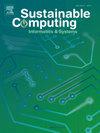Fully-connected layers-embedded self-attention optimizer based on quantum-inspired and fuzzy logic for smart household energy management
IF 5.7
3区 计算机科学
Q1 COMPUTER SCIENCE, HARDWARE & ARCHITECTURE
引用次数: 0
Abstract
On the road to carbon neutrality, the solution to the power consumption optimization problem of thousands of households is an essential link. This work mainly constructs a mathematical model of a smart household energy management system (HEMS) considering the real-time users’ willingness. The work proposes a fully-connected layers-embedded self-attention optimizer (FCSAO) based on quantum and fuzzy logic for the HEMS models. The FCSAO is an optimization method accelerated by fully-connected layers-embedded self-attention networks (FCSANs), quantum-inspired logic, and fuzzy logic. In a conventional optimization algorithm iteration process, a generative adversarial network incorporating a self-attention mechanism is adopted to characterize the input-output relationship of the optimization problem, and a quantum universal gate is employed to train the deep network by dividing the dataset into four classes based on the output of the optimization problem. The trained deep network can accelerate the iterative process of traditional optimization algorithm. The smart HEMS divides the loads in the home into rigid loads, adjustable loads, and air conditioner loads. The smart HEMS model meets the goals of users to save electrical energy and reduce electricity price expenditure by the proposed FCSAO based on quantum-inspired and fuzzy logic. Besides, the smart HEMS model can effectively control the operation state of the air conditioner and give the optimal operation time of adjustable loads. Furthermore, with three different scenarios simulated in MATLAB, the optimized indoor temperature meets users’ willingness for temperature comfort level by the proposed FCSAO based on quantum-inspired and fuzzy logic with great expression capability; the proposed FCSAO saves 1.05 % electricity cost.
基于量子启发和模糊逻辑的智能家庭能源管理全连接层嵌入式自关注优化器
在碳中和的道路上,解决千家万户的用电优化问题是必不可少的一环。本文主要构建了考虑实时用户意愿的智能家庭能源管理系统(HEMS)数学模型。本文提出了一种基于量子和模糊逻辑的全连接层嵌入式自关注优化器(FCSAO)。FCSAO是一种由全连接层嵌入自关注网络(fcsan)、量子启发逻辑和模糊逻辑加速的优化方法。在传统的优化算法迭代过程中,采用结合自关注机制的生成对抗网络来表征优化问题的输入输出关系,并基于优化问题的输出将数据集划分为四类,采用量子通用门来训练深度网络。训练后的深度网络可以加速传统优化算法的迭代过程。智能HEMS将家庭负荷分为刚性负荷、可调负荷和空调负荷。智能HEMS模型通过提出的基于量子启发和模糊逻辑的FCSAO实现了用户节约电能和降低电价支出的目标。此外,智能HEMS模型可以有效地控制空调的运行状态,给出可调负荷的最佳运行时间。在MATLAB中对三种不同的场景进行了仿真,结果表明,基于量子启发和模糊逻辑的FCSAO优化后的室内温度满足用户对温度舒适度的要求,具有较强的表达能力;建议的FCSAO节省1.05 %的电费。
本文章由计算机程序翻译,如有差异,请以英文原文为准。
求助全文
约1分钟内获得全文
求助全文
来源期刊

Sustainable Computing-Informatics & Systems
COMPUTER SCIENCE, HARDWARE & ARCHITECTUREC-COMPUTER SCIENCE, INFORMATION SYSTEMS
CiteScore
10.70
自引率
4.40%
发文量
142
期刊介绍:
Sustainable computing is a rapidly expanding research area spanning the fields of computer science and engineering, electrical engineering as well as other engineering disciplines. The aim of Sustainable Computing: Informatics and Systems (SUSCOM) is to publish the myriad research findings related to energy-aware and thermal-aware management of computing resource. Equally important is a spectrum of related research issues such as applications of computing that can have ecological and societal impacts. SUSCOM publishes original and timely research papers and survey articles in current areas of power, energy, temperature, and environment related research areas of current importance to readers. SUSCOM has an editorial board comprising prominent researchers from around the world and selects competitively evaluated peer-reviewed papers.
 求助内容:
求助内容: 应助结果提醒方式:
应助结果提醒方式:


